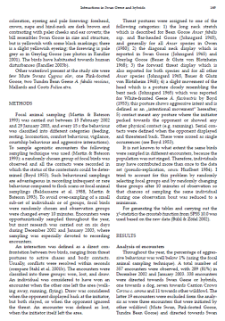- Wyszukaj w całym Repozytorium
- Piśmiennictwo i mapy
- Archeologia
- Baza Młynów
- Nauki przyrodnicze
Wyszukiwanie zaawansowane
Wyszukiwanie zaawansowane
Wyszukiwanie zaawansowane
Wyszukiwanie zaawansowane
Wyszukiwanie zaawansowane

Obiekt
Tytuł: Variation in Timing of the Siberian Knot Calidris c. canutus Autumn Migration in the Puck Bay Region (Southern Baltic)
Subtitle:
Międzysezonowa zmienność czasu wędrówki jesiennej biegusa rdzawego przez Zatokę Puckę ; Autumn migration of Siberian Knot
Contributor:
Museum and Institute of Zoology, Polish Academy of Sciences
Publisher:
Museum and Institute of Zoology, Polish Academy of Sciences
Place of publishing:
Description:
Type of object:
Abstract:
The first stage of the Siberian Knot's autumn migration between its breeding grounds in Taimyr, Siberia and the W European tidal flats is still poorly understood, despite our expanding knowledge of this species. This paper analyses data (1988–1995) on the numbers of Knots and the timing of their migration in the Puck Bay region of the Baltic Sea (N Poland). The timing varied greatly between seasons. The timing of adult migration is linked to breeding success. In seasons with low breeding success both males and females leave the breeding grounds earlier, and the correlation between the mean date of adult migration and the number of juveniles is consistent with this phenology. The differences between the departure dates from the Taimyr breeding grounds provided by published sources and the dates of arrival at Puck Bay suggest that Knots cross the northern tundra regions very quickly (at least, the earliest birds to arrive do so). The numbers of juvenile Knots turning up on the Polish coast appear to depend not only on the lemming cycle in the breeding grounds, but also on other factors, like local weather conditions, which could influence the number of juveniles observed.
Relation:
Volume:
Issue:
Start page:
End page:
Detailed Resource Type:
Format:
Resource Identifier:
oai:rcin.org.pl:55539 ; 10.3161/068.040.0205
Source:
MiIZ PAN, call no. P.257 ; MiIZ PAN, call no. P.4568
Language:
Language of abstract:
Rights:
Terms of use:
Copyright-protected material. May be used within the limits of statutory user freedoms
Digitizing institution:
Museum and Institute of Zoology of the Polish Academy of Sciences
Original in:
Library of the Museum and Institute of Zoology of the Polish Academy of Sciences
Projects co-financed by:
Programme Innovative Economy, 2010-2014, Priority Axis 2. R&D infrastructure ; European Union. European Regional Development Fund
Access:
Kolekcje, do których przypisany jest obiekt:
- Repozytorium Cyfrowe Instytutów Naukowych > Kolekcje Partnerów > Muzeum i Instytut Zoologii PAN > Czasopisma
- Repozytorium Cyfrowe Instytutów Naukowych > Kolekcje Partnerów > Muzeum i Instytut Zoologii PAN > Wydawnictwa MiIZ PAN > Acta Ornithologica
- Repozytorium Cyfrowe Instytutów Naukowych > Piśmiennictwo > Czasopisma/Artykuły
Data ostatniej modyfikacji:
Feb 4, 2025
Data dodania obiektu:
Jul 28, 2015
Liczba pobrań / odtworzeń:
50
Wszystkie dostępne wersje tego obiektu:
https://rcin.org.pl./publication/75770
Wyświetl opis w formacie RDF:
Wyświetl opis w formacie RDFa:
Wyświetl opis w formacie OAI-PMH:
Obiekty Podobne
Piersma, Theunis Dietz, Maurine W. Dekinga, Anne Nebel, Silke Gils, Jan van Battley, Phil F. Spaans, Bernard
Nowakowski, Jarosław K Remisiewicz, Magdalena Keller, Marek Busse, Przemysław Rowiński, Patryk
Banzhaf, Walter (1901–1941)
Busse, Przemysław (1937– ) Halastra-Petryna, Grażyna
Godunko, Roman J. Neumann, Christian
Godunko, Roman J. Neumann, Christian Krzemiński, Wiesław
Busse, Przemysław (1937– )
Kania, Wojciech Maria (1943– )

 INSTYTUT ARCHEOLOGII I ETNOLOGII POLSKIEJ AKADEMII NAUK
INSTYTUT ARCHEOLOGII I ETNOLOGII POLSKIEJ AKADEMII NAUK
 INSTYTUT BADAŃ LITERACKICH POLSKIEJ AKADEMII NAUK
INSTYTUT BADAŃ LITERACKICH POLSKIEJ AKADEMII NAUK
 INSTYTUT BADAWCZY LEŚNICTWA
INSTYTUT BADAWCZY LEŚNICTWA
 INSTYTUT BIOLOGII DOŚWIADCZALNEJ IM. MARCELEGO NENCKIEGO POLSKIEJ AKADEMII NAUK
INSTYTUT BIOLOGII DOŚWIADCZALNEJ IM. MARCELEGO NENCKIEGO POLSKIEJ AKADEMII NAUK
 INSTYTUT BIOLOGII SSAKÓW POLSKIEJ AKADEMII NAUK
INSTYTUT BIOLOGII SSAKÓW POLSKIEJ AKADEMII NAUK
 INSTYTUT CHEMII FIZYCZNEJ PAN
INSTYTUT CHEMII FIZYCZNEJ PAN
 INSTYTUT CHEMII ORGANICZNEJ PAN
INSTYTUT CHEMII ORGANICZNEJ PAN
 INSTYTUT FILOZOFII I SOCJOLOGII PAN
INSTYTUT FILOZOFII I SOCJOLOGII PAN
 INSTYTUT GEOGRAFII I PRZESTRZENNEGO ZAGOSPODAROWANIA PAN
INSTYTUT GEOGRAFII I PRZESTRZENNEGO ZAGOSPODAROWANIA PAN
 INSTYTUT HISTORII im. TADEUSZA MANTEUFFLA POLSKIEJ AKADEMII NAUK
INSTYTUT HISTORII im. TADEUSZA MANTEUFFLA POLSKIEJ AKADEMII NAUK
 INSTYTUT JĘZYKA POLSKIEGO POLSKIEJ AKADEMII NAUK
INSTYTUT JĘZYKA POLSKIEGO POLSKIEJ AKADEMII NAUK
 INSTYTUT MATEMATYCZNY PAN
INSTYTUT MATEMATYCZNY PAN
 INSTYTUT MEDYCYNY DOŚWIADCZALNEJ I KLINICZNEJ IM.MIROSŁAWA MOSSAKOWSKIEGO POLSKIEJ AKADEMII NAUK
INSTYTUT MEDYCYNY DOŚWIADCZALNEJ I KLINICZNEJ IM.MIROSŁAWA MOSSAKOWSKIEGO POLSKIEJ AKADEMII NAUK
 INSTYTUT PODSTAWOWYCH PROBLEMÓW TECHNIKI PAN
INSTYTUT PODSTAWOWYCH PROBLEMÓW TECHNIKI PAN
 INSTYTUT SLAWISTYKI PAN
INSTYTUT SLAWISTYKI PAN
 SIEĆ BADAWCZA ŁUKASIEWICZ - INSTYTUT TECHNOLOGII MATERIAŁÓW ELEKTRONICZNYCH
SIEĆ BADAWCZA ŁUKASIEWICZ - INSTYTUT TECHNOLOGII MATERIAŁÓW ELEKTRONICZNYCH
 MUZEUM I INSTYTUT ZOOLOGII POLSKIEJ AKADEMII NAUK
MUZEUM I INSTYTUT ZOOLOGII POLSKIEJ AKADEMII NAUK
 INSTYTUT BADAŃ SYSTEMOWYCH PAN
INSTYTUT BADAŃ SYSTEMOWYCH PAN
 INSTYTUT BOTANIKI IM. WŁADYSŁAWA SZAFERA POLSKIEJ AKADEMII NAUK
INSTYTUT BOTANIKI IM. WŁADYSŁAWA SZAFERA POLSKIEJ AKADEMII NAUK




































